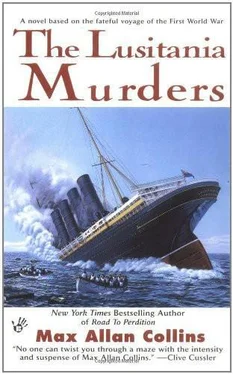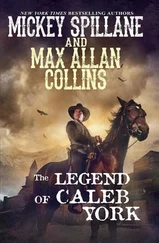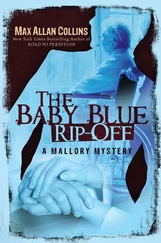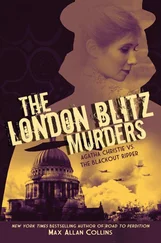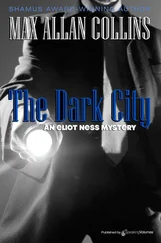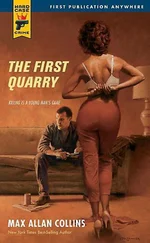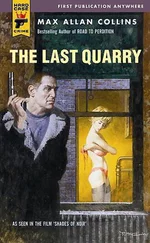Max Collins - The Lusitania Murders
Здесь есть возможность читать онлайн «Max Collins - The Lusitania Murders» весь текст электронной книги совершенно бесплатно (целиком полную версию без сокращений). В некоторых случаях можно слушать аудио, скачать через торрент в формате fb2 и присутствует краткое содержание. Жанр: Криминальный детектив, на английском языке. Описание произведения, (предисловие) а так же отзывы посетителей доступны на портале библиотеки ЛибКат.
- Название:The Lusitania Murders
- Автор:
- Жанр:
- Год:неизвестен
- ISBN:нет данных
- Рейтинг книги:3 / 5. Голосов: 1
-
Избранное:Добавить в избранное
- Отзывы:
-
Ваша оценка:
- 60
- 1
- 2
- 3
- 4
- 5
The Lusitania Murders: краткое содержание, описание и аннотация
Предлагаем к чтению аннотацию, описание, краткое содержание или предисловие (зависит от того, что написал сам автор книги «The Lusitania Murders»). Если вы не нашли необходимую информацию о книге — напишите в комментариях, мы постараемся отыскать её.
The Lusitania Murders — читать онлайн бесплатно полную книгу (весь текст) целиком
Ниже представлен текст книги, разбитый по страницам. Система сохранения места последней прочитанной страницы, позволяет с удобством читать онлайн бесплатно книгу «The Lusitania Murders», без необходимости каждый раз заново искать на чём Вы остановились. Поставьте закладку, и сможете в любой момент перейти на страницу, на которой закончили чтение.
Интервал:
Закладка:
“Some,” Frohman said, “scurried away-must have thought she was trying to take their life jackets! Cowards.”
“You have enough for yourselves?” I asked, meaning the life jackets, feeling somewhat guilty bearing a pair of them myself, for Miss Vance and me.
“Certainly,” Vanderbilt said cheerfully. “Good luck to you, man!”
“Mr. Frohman-C.F.? I can help walk you along-we are moments away from. .”
He smiled up at me, that homely face a beautiful thing. “ ‘Why fear death? It is the most beautiful adventure in life.’ ”
“What’s that, a Hubbardism?”
Frohman seemed a little offended. “Hardly! James Barrie- Peter Pan .”
And the froggy producer returned to his slumbering infants in their Moses’ baskets, who unknowingly awaited far worse perils than mere bulrushes.
Disturbed though I was to have lost track of Miss Vance, I had confidence in her competence-her cool head and professionalism would rise well above the mad scramble. Or so I told myself, to hang on to hope and sanity. On the promendade, however, the rush was over, confusion replacing panic-people were milling, thronging the deck waiting for a discipline or order to be imposed upon them. .which seemed unlikely to be provided.
The Hubbards were nowhere to be seen-they had vacated (or been pushed away from) their position at the rail. In the undiscriminating mix of passengers from all three classes, I saw the occasional familiar face. Miss Pope and her Friend dove from the deck, choosing not to get involved with the lifeboats at all. Madame DePage, I noted, was bandaging the wounded with strips of cloth torn from her own dress; Dr. Houghton was aiding her. No sign of Miss Vance, though.
The lifeboat situation was hopeless.* Crewmen and male passengers were striving without luck to lower the boats, and were placing women and children into them. Horror-struck, I realized these boats would never be cleared, and would go down with the steamer. . which surely would make her final plunge any second now. Better to leave these poor souls on the deck, where they might have a chance, might find a piece of wreckage to use as a makeshift raft, a table, a deck chair, a wooden grating.
A bit aft of the main entrance, a lifeboat filled with women and children-Miss Vance not among them-waited patiently for help that would probably never come. No one was even attempting to free the craft from its davits. With the steamer sinking so rapidly, the boat would have to be cleared at once, if they were to be saved.
Staff Captain Anderson-in his shirtsleeves, his affable manner replaced by a tense grim demeanor-was doing his best to supervise the ill-advised launching of the boats. I went to him and suggested that the ship was sinking so fast, they might be better off waiting till the water reached the ship’s keel, and simply cut the ropes, and simultaneously knock the snubbing chains loose.
He was ahead of me; he pointed to a boat nearby where seamen were poised to do exactly what I’d suggested.
And at this moment a man in white who was not a crew member approached one of those seamen, and was speaking to him.
“Christ!” I blurted. “That’s Williamson!”
Anderson’s gaze flew to the man, who was snarling at the seaman, “Launch this boat, now!”
Williamson obviously planned to leap inside the craft.
“Can’t do it,” the seaman said, a young blonde lad. “Captain’s orders.”
And Williamson thrust a revolver toward the seaman-that gun he’d taken from the master-at-arms-and said, “To hell with the captain- do it !”
I stood frozen-all this ship needed right now was a madman shooting off a gun! But Anderson was edging forward, moving closer to Williamson, whose back was to the staff captain.
The young seaman complied with Williamson’s demands, freeing the snubbing chain.
Freed of its restraint, the boat swung inward like a pendulum and smashed into Williamson, squashing him like a bug against the boat’s gunwale. Any cry of his was obscured by the screams of passengers as the lifeboat crashed to the deck, sliding forcefully into a waiting knot of crew and passengers, Anderson among them. I plastered myself against the wall, the boatload of terrified women and children narrowly missing me, but sweeping the others with them, the unconscious staff captain, too, down the deck and into the rising sea.
Around me screams of horror followed the stunning display of brute stupidity-the author of which, one Charles Williamson, lay a crushed open-eyed corpse beneath the blood-smeared gunwale.
In moments the sea would come up and wash me off the deck, too; so I beat the bastard to it, and dove in. The coldness was a shock, yet somehow bracing, even invigorating, and I swam, despite the bulk of the life jacket, swam a good hundred feet away from the ship before turning, and treaded water. I wondered if anyone, perhaps from that crashed lifeboat, was following, and needed a hand.
I also wanted to see the steamer’s final plunge. The bow already buried beneath the sea, the ship’s fantail loomed a hundred feet into the placid blue sky, revealing four huge propellers, barely turning, and an immense rudder, sunlight glinting off their steel. Sliding into the blue waters, the ship suddenly, bizarrely, froze-the nose of the great ship, its eight-hundred-foot length deeper than the sea, had hit bottom!
A terrible clash and clatter echoed across the water as everything within her collapsed and scattered itself, as if a giant box of broken glass and spare metal parts were being shaken by a playful, nasty god.
Hundreds were mountain-climbing the slanted deck, seeking handholds, some falling into the sea, as the dying beast that was the Lusitania made its final agonized death cries-a boiler exploding, a funnel crashing, one last great moan of tortured steel.
Then she was gone-slipping under the water with no significant suction, no boiling vortex, foam flecking the last glimpse of her superstructure and decks, a few boats still swinging like toys from their davits. . a finger snap, and the big Lucy had disappeared.* She left behind a wide white ring glimmering on the surface of an otherwise smooth sea in the afternoon sun. Within that ring was a snarl of floating wreckage and bodies, on and under the surface, some of them alive, gaggles of men and women and children twisting like flies on some giant fisherman’s hook.
For a while I swam around and helped those I could by pushing pieces of wreckage to them, to which they might cling. After some fifteen minutes of this, I was getting tired, and cold, and was just realizing I was in trouble, when arms hauled me up out of the water and into a collapsible boat, a shallow thing with its folded canvas sides up.
The boat was filled with people-twenty or more, men enough to row but mostly women and children. A voice called out my name to me, and either I was dreaming a sweet dying dream, or had unpredictably enough gone to heaven.
Because the voice was Miss Vance’s, and I was soon, half-conscious, sheltered within the embrace of her damp but wonderful arms.
“I hope Williamson drowned in his cage,” she said, sometime later.
“Oh,” I said, “it was much better than that.”
Not much else is worth the telling. Our lifeboat had a good crew, which included that fellow Lauriat, and we might have headed for land but instead stayed out and, for two hours or so, picked up those who seemed in the most helpless of conditions. I will spare you the tragic images, involving women and children, particularly mothers and their babies. Some of the babies in their nursery baskets, thanks to Vanderbilt and Frohman, were retrieved from the sea.
When we had as many aboard as we dared-thirty-two was the final count, I believe-we finally rowed toward shore, but first encountered a fishing smack. Though they had already taken on two boatloads of survivors, they made room for us, as well.
Читать дальшеИнтервал:
Закладка:
Похожие книги на «The Lusitania Murders»
Представляем Вашему вниманию похожие книги на «The Lusitania Murders» списком для выбора. Мы отобрали схожую по названию и смыслу литературу в надежде предоставить читателям больше вариантов отыскать новые, интересные, ещё непрочитанные произведения.
Обсуждение, отзывы о книге «The Lusitania Murders» и просто собственные мнения читателей. Оставьте ваши комментарии, напишите, что Вы думаете о произведении, его смысле или главных героях. Укажите что конкретно понравилось, а что нет, и почему Вы так считаете.
